Everyday tools and equipment for baking in the past
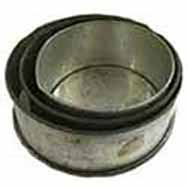
Plastics in the kitchen were few and far between before the mid-late 20th century, but other materials took their place. They did not look at clean and attractive as today's items, but they were functional. This page elaborates by illustrating and discussing the range of tools and equipment used in baking cakes, pies, tarts and the like.
____
By the webmaster: her early recollections with discussions from others who lived at the time
The ovens
The oven in which my mother did her baking in the mid-1900s was a gas oven. My grandmother baked on an early cast iron kitchen range. They both used the following tools and equipment in their baking and I used them too as a child and young teenager. More general kitchen equipment is considered on another page.
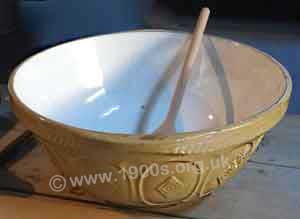
Mixing bowl with wooden spoon
Mixing bowls were made of what we called china and today is called ceramic.
For some inexplicable reason, all mixing bowls looked like this: white inside and cream outside with a typical raised pattern, although any ceramic would have served.
There were also miscellaneous white china bowls in various sizes for various purposes like beating eggs into, but they did not have the coloured or decorated outsides.
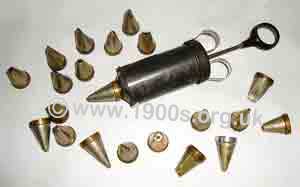
Icing set with interchangeable nozzles
Icing sets were all metal. It was hard work to force icing sugar out through the nozzles, so two fingers of one hand went through the finger holes and the other hand held the plunger. Then both hands worked together.
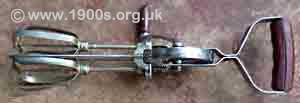
Egg beater
Egg beaters were hand operated made of metal but with a wooden handle.
Turning the handle made the paddles rotate surprisingly quickly and effectively in shelled eggs.
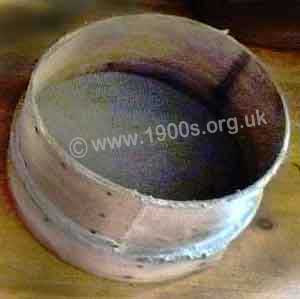
Flour sieve
The casing for the metal mesh is thin whitewood, bent and secured into a circular shape.
The mesh is metal. Of all the old tools, this, to me, was the only one that always looked dirty, although I am sure that it was scrubbed regularly after use.
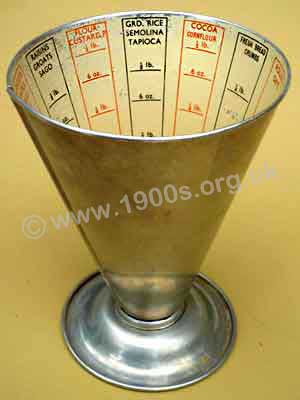
Measure for weighing by volume
My mother's scales were inherited and too clumsy for delicate cake-making, although more delicate scales did exist and must have been used in other families.
So my mother used this device to weigh by volume. Note the old imperial weight system of ounces and pounds.
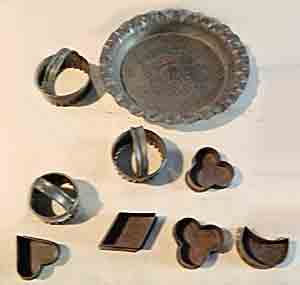
Biscuit cutters and moulds
Cutters were made of metal and must have been make of steel, not stainless steel, because they, like cake tins, always looked dirty because they were tarnished.
How it all changed: the Kenwood Chef electric food mixer
You can see how much hard work it was to use these tools because they had to be used by hand. The Kenwood Chef changed everything. It came on the market in the 1950s and actually mixed food by just pressing a button. It came with numerous attachments for mixing different sorts of dough and the speed of mixing could also be adjusted. It was driven, of course, by electricity. It was the ultimate wedding present in the 1960s.
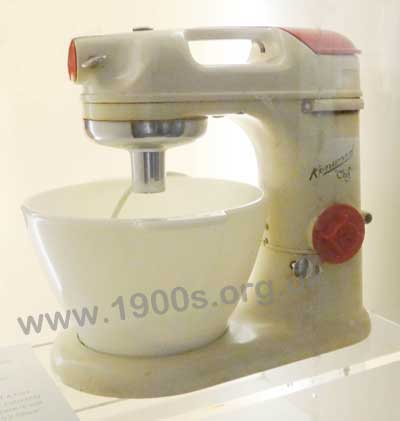
Kenwood Chef food mixer. Photographed in The Lightbox, Woking.
I was offered one as a wedding present by my mother-in-law. The idea was that it was going to save me a great deal of time and effort in my new domestic role. She had one herself and thought it was wonderful. In practice, though, I didn't like its bulk as it had to stand, always on show, on a surface even when not in use. I made it clear that I would prefer a smaller electric hand mixer. Clearly my mother-in-law didn't approve, as she expected her son's wife to spend her time working in the kitchen. In the end, I had to buy the hand mixer myself, but I have never regretted it.
| sources | webmaster | contact |
Text and images are copyright
If you can add anything to this page or provide a photo, please contact me.



